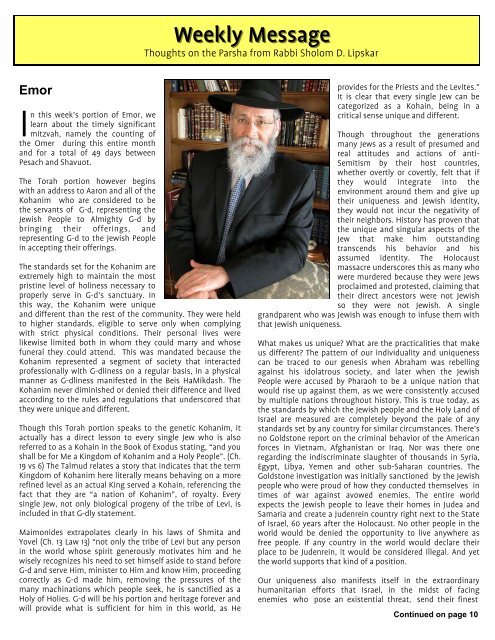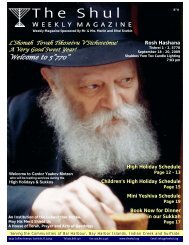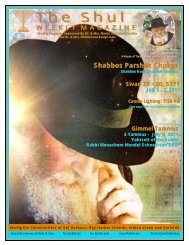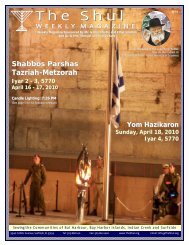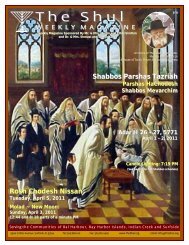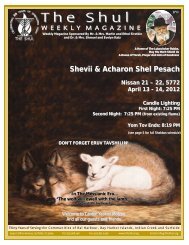You also want an ePaper? Increase the reach of your titles
YUMPU automatically turns print PDFs into web optimized ePapers that Google loves.
<strong>Emor</strong><br />
I<br />
n this week’s portion of <strong>Emor</strong>, we<br />
learn about the timely significant<br />
mitzvah, namely the counting of<br />
the Omer during this entire month<br />
and for a total of 49 days between<br />
Pesach and Shavuot.<br />
The Torah portion however begins<br />
with an address to Aaron and all of the<br />
Kohanim who are considered to be<br />
the servants of G-d, representing the<br />
Jewish People to Almighty G-d by<br />
bringing their offerings, and<br />
representing G-d to the Jewish People<br />
in accepting their offerings.<br />
The standards set for the Kohanim are<br />
extremely high to maintain the most<br />
pristine level of holiness necessary to<br />
properly serve in G-d’s sanctuary. In<br />
this way, the Kohanim were unique<br />
and different than the rest of the community. They were held<br />
to higher standards, eligible to serve only when complying<br />
with strict physical conditions. Their personal lives were<br />
likewise limited both in whom they could marry and whose<br />
funeral they could attend. This was mandated because the<br />
Kohanim represented a segment of society that interacted<br />
professionally with G-dliness on a regular basis, in a physical<br />
manner as G-dliness manifested in the Beis HaMikdash. The<br />
Kohanim never diminished or denied their difference and lived<br />
according to the rules and regulations that underscored that<br />
they were unique and different.<br />
Though this Torah portion speaks to the genetic Kohanim, it<br />
actually has a direct lesson to every single Jew who is also<br />
referred to as a Kohain in the Book of Exodus stating, “and you<br />
shall be for Me a Kingdom of Kohanim and a Holy People”. (Ch.<br />
19 vs 6) The Talmud relates a story that indicates that the term<br />
Kingdom of Kohanim here literally means behaving on a more<br />
refined level as an actual King served a Kohain, referencing the<br />
fact that they are “a nation of Kohanim”, of royalty. Every<br />
single Jew, not only biological progeny of the tribe of Levi, is<br />
included in that G-dly statement.<br />
Maimonides extrapolates clearly in his laws of Shmita and<br />
Yovel (Ch. 13 Law 13) “not only the tribe of Levi but any person<br />
in the world whose spirit generously motivates him and he<br />
wisely recognizes his need to set himself aside to stand before<br />
G-d and serve Him, minister to Him and know Him, proceeding<br />
correctly as G-d made him, removing the pressures of the<br />
many machinations which people seek, he is sanctified as a<br />
Holy of Holies. G-d will be his portion and heritage forever and<br />
will provide what is sufficient for him in this world, as He<br />
Weekly Message<br />
Thoughts on the Parsha from Rabbi Sholom D. Lipskar<br />
provides for the Priests and the Levites.”<br />
It is clear that every single Jew can be<br />
categorized as a Kohain, being in a<br />
critical sense unique and different.<br />
Though throughout the generations<br />
many Jews as a result of presumed and<br />
real attitudes and actions of anti-<br />
Semitism by their host countries,<br />
whether overtly or covertly, felt that if<br />
they would integrate into the<br />
environment around them and give up<br />
their uniqueness and Jewish identity,<br />
they would not incur the negativity of<br />
their neighbors. History has proven that<br />
the unique and singular aspects of the<br />
Jew that make him outstanding<br />
transcends his behavior and his<br />
assumed identity. The Holocaust<br />
massacre underscores this as many who<br />
were murdered because they were Jews<br />
proclaimed and protested, claiming that<br />
their direct ancestors were not Jewish<br />
so they were not Jewish. A single<br />
grandparent who was Jewish was enough to infuse them with<br />
that Jewish uniqueness.<br />
What makes us unique? What are the practicalities that make<br />
us different? The pattern of our individuality and uniqueness<br />
can be traced to our genesis when Abraham was rebelling<br />
against his idolatrous society, and later when the Jewish<br />
People were accused by Pharaoh to be a unique nation that<br />
would rise up against them, as we were consistently accused<br />
by multiple nations throughout history. This is true today, as<br />
the standards by which the Jewish people and the Holy Land of<br />
Israel are measured are completely beyond the pale of any<br />
standards set by any country for similar circumstances. There’s<br />
no Goldstone report on the criminal behavior of the American<br />
forces in Vietnam, Afghanistan or Iraq. Nor was there one<br />
regarding the indiscriminate slaughter of thousands in Syria,<br />
Egypt, Libya, Yemen and other sub-Saharan countries. The<br />
Goldstone investigation was initially sanctioned by the Jewish<br />
people who were proud of how they conducted themselves in<br />
times of war against avowed enemies. The entire world<br />
expects the Jewish people to leave their homes in Judea and<br />
Samaria and create a Judenrein country right next to the State<br />
of Israel, 60 years after the Holocaust. No other people in the<br />
world would be denied the opportunity to live anywhere as<br />
free people. If any country in the world would declare their<br />
place to be Judenrein, it would be considered illegal. And yet<br />
the world supports that kind of a position.<br />
Our uniqueness also manifests itself in the extraordinary<br />
humanitarian efforts that Israel, in the midst of facing<br />
enemies who pose an existential threat, send their finest<br />
Continued on page 10


